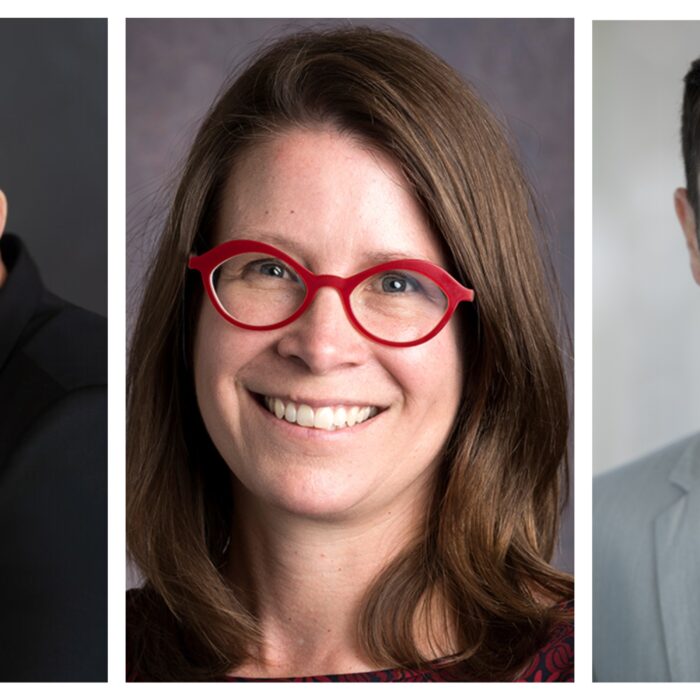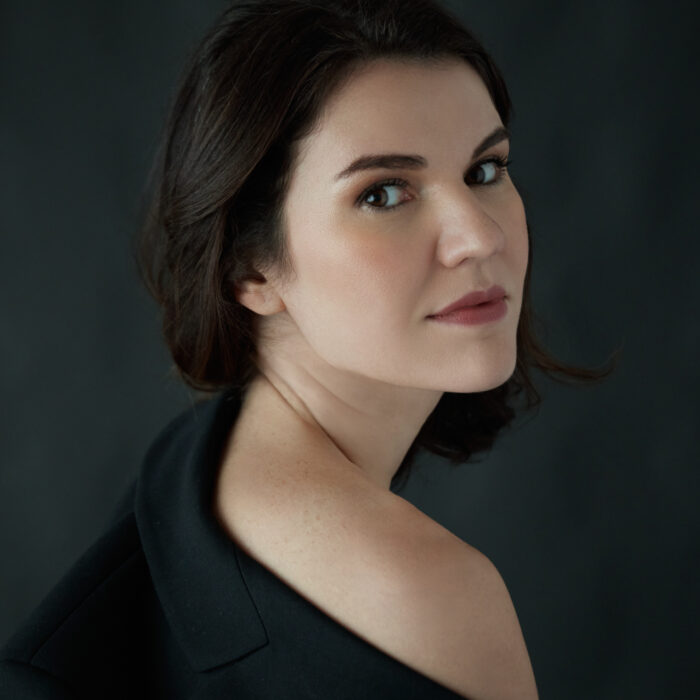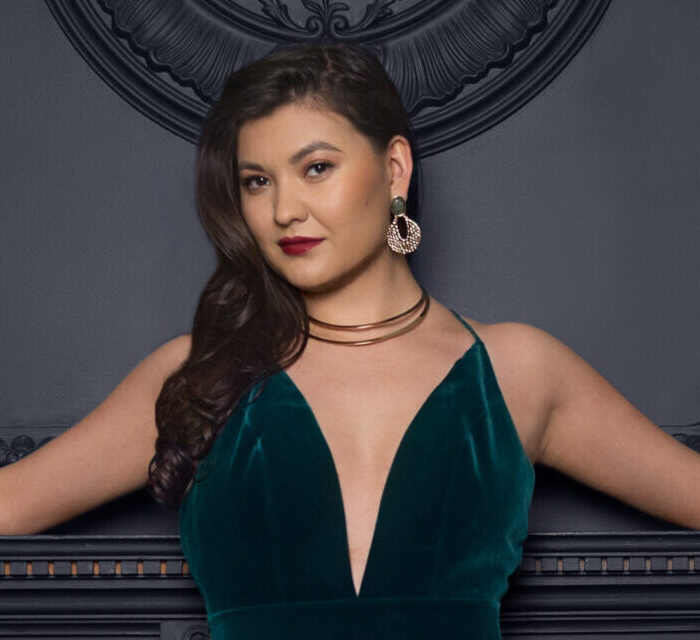
Q & A: Mezzo-Soprano Sarah Richmond on Her Forthcoming Role as Olga for Northern Ireland Opera
By Alan Neilson(Photo: Ross Kavanagh)
This September, Northern Ireland Opera premieres its new production of Tchaikovsky’s “Eugene Onegin”, with its quality cast members directed by Cameron Menzies, and conducted by Dominic Limburg. This production looks certain to be another hit with local audiences, following its sell-out productions of “La Traviata” and “Tosca.”
OperaWire met up with one of its stars, mezzo-soprano Sarah Richmond, a local singer who will be playing the role of Olga. Having put her career on the back burner for a few years due to family reasons, she came back fully recharged. In 2021 she won the Toronto Mozart Vocal Competition, which she followed up by winning the 2022 New York NYIOP ANON Competition and qualifying as a finalist for the 2022 Montserrat Caballé Competition at the Teatro Real. Her stage performances in a wide variety of roles have received a series of excellent reviews from critics, with OperaWire remarking on “her agile, expressive voice” as Argene in Vivaldi’s “L’Olimpiade” for Irish National Opera, further commenting that she added to the dramatic impact through her “sensitively crafted, detailed recitatives.”
OperaWire: What was your pathway into a career as an opera singer?
Sarah Richmond: I have always loved singing. I came from a family that loved to sing; both my parents sang in the church choir. I can still remember singing even as a very young child. I used to listen to all sorts of music, especially the Rat Pack and Frank Sinatra. I saw my first opera in my early teens – it was “Madame Butterfly” – and it was then that I knew I wanted to be an opera singer.
In my final year of school, I applied for a whole range of courses as I wasn’t sure what I wanted to do, but settled on a degree in art. It didn’t last long. I quickly understood that I wanted to do something related to singing and switched to a music degree at Queen’s University in Belfast. I then took the regular path and went on to study at the Royal Northern College of Music in Manchester on a scholarship, which I followed up with an acting based course at English National Opera’s Opera Works Programme.
OW: You have taken part in numerous competitions and had a lot of success. Was this a strategy for establishing your career, or was it because you just enjoyed doing competitions?
SR: I definitely don’t like competitions, but it’s something I thought I had to do as a way of getting noticed, of getting employment and of finding an agent. Unfortunately, I soon found out that it is not that simple; even though I won competitions, it was still difficult to find positions.
I think I should add a little context here. When I finished my master’s degree at the Royal Northern College of Music, I decided to start a family, and my career had to go on hold for a few years; my family came first! I didn’t stop singing completely, but it was impossible to do as much as I should have. Since then, I’ve been playing catch-up. It was a difficult time because I could only take work that was close to home, and that acts as a big restriction. Now that my son is older, I have more time and have started to get back into the routine again and I am pushing my career forward. Anyway, things now seem to be working out.
One of the positives of winning competitions is that it is great for your self-esteem because the other finalists are all very good singers. If you win, it really makes you feel that you’re doing something right.
OW: On stage, you seem to really enjoy the acting side of being an opera singer. How do you approach this aspect of the job?
SR: It depends on the production. For large auditoriums, it is necessary to make everything bigger and to maximize gestures and movements so that the audience can see what is happening. In small venues, it’s more like being on the television set, so you act in a more lifelike way.
But you are right; I do love acting a lot. I feel free when I’m on stage.
OW: You also appear very confident on stage. How do you manage your nerves, or are you a naturally confident person?
SR: If I know the role well, I am not particularly nervous. If I know that I can react if things go wrong on stage, then I am fine. It is all about preparation. If I have prepared properly, I feel confident. It’s not that I don’t get nervous at all. Yesterday evening, for example, I was due to sing Elgar’s “Sea Pictures,” which was to be recorded by the BBC. At the last minute, due to the possibility of riots in the city, they wanted the rehearsal recorded in case of any problems. I was not expecting this at all, and it made me nervous. For the first time in my life, I forgot my words. It didn’t matter in the end, as the actual evening performance went ahead without any problems.
OW: You have a varied repertoire. Is this deliberate, or do you have a preference?
SR: I am not in a position where I can turn work away. So, I take on any roles I feel that I can do. However, I do love certain types of music, particularly the German Romanticism of Strauss and Mahler. I really love the lush sound, but also the stories they tell.
OW: How would you describe your voice?
SR: I have a luscious mezzo with a good upper extension. It is a strong voice with plenty of agility. I can sing from low D to high C; it is a wide range that blooms best in the middle. I would call myself a lyric, but I am also comfortable singing coloratura and dramatic roles.
OW: You are about to sing Olga in Northern Ireland Opera’s production of “Eugene Onegin.” What are your views on the character?
SR: The first thing I did was read Pushkin’s poem. At the moment, however, I haven’t fully worked her out as a human being. I find it frustrating that she’s coquettish and an airhead. I see her as someone who really wants a better life, so she is constantly trying to be positive, but I also find her cruel and heartless, for example, why does she dance with Onegin a second time knowing it will make Lensky jealous? What kind of person would do that? Doesn’t she think about things? I suppose that is why I think of her as an airhead.
However, these are only my first thoughts. They are still in a state of development, and I have yet to speak to the director about his thoughts on the character.
OW: What challenges do you see in performing the role?
SR: Well, I don’t speak Russian, and although I have been working on its pronunciation with the language coach, Lada Valesova and really enjoying it, it is difficult. I don’t understand the language at all; I don’t know the meaning of the words or how to inflect them. I am having to remember the text word for word and to learn their individual meanings. With German or Italian, I can understand how the words translate into English, and I know how to inflect each word, but with Russian, it is literally like being a child again. Sometimes I think in terms of pictures, which helps me remember the meaning of the words, but most of it is continuous repetition, learning it word for word, remembering how each word is pronounced, and what emphasis it needs to be given. It is very time-consuming, but ultimately, I can say that it is a rewarding experience.
Also, Olga lies is a little on the low side for it to fit my voice perfectly, but it is not a role I see as being particularly difficult. With sufficient preparation, I shall be able to accommodate the vocal challenges. I’m now waiting to find out what size the orchestra will be. It can be challenging working with a new orchestra, so I am very excited about the sitzprobe.
On the acting side, I don’t see any particular challenges. I just need to talk to Cameron, the director, about what he wants from the role.
OW: You recently sang the role of Argene in Irish National Opera’s production of Vivaldi’s “L’Olimpiade.” What were your impressions?
SR: I only had a small role, but I enjoyed it. It was great working with the director, Daisy Evans. She provided you with the ideas and then allowed you to do your own thing with them and she would only tweak them if necessary.
The conductor, Peter Whelan, is also great to work with. He makes baroque music sound like rock’n’roll; when we were not on stage, we would be dancing in the wings.
It is quite a long opera, so there were a number of cuts, which was a pity, as I would have liked to have done one more aria just to show what I can do. I had spent such a long time preparing the ornamentations, but I didn’t have the chance to present them all as during the rehearsals where we explored the character we decided against the more elborate ornamentations. I also found singing the baroque more difficult than other repertoire; I found that I was having to think more about exactly what I was doing. Normally, I find singing more automatic.
OW: What roles will you be performing over the coming months?
SR: We will be performing the Vivaldi again, this time in Sicily. Then I am off to Bolzano to sing La Ciesca in “Gianni Schicchi.” I also have an upcoming concert based around neurodiversity and an opera gala concert event before the Christmas season commences.
OW: What roles would you like to sing, and in what venues would you like to perform?
SR: I would love to sing the Komponist in “Ariadne auf Naxos” and Charlotte in “Werther,” as well as Orfeo in “Orfeo ed Euridice,” the title role in Britten’s “The Rape of Lucretia” and Orsini in “Lucrezia Borgia.” I would love to be able to sing at the top festivals around the world and in the major houses in Europe, and to perform with the Berlin Philharmonic and the Vienna Philharmonic orchestras. Also, I would love to sing in the Harpa hall in Iceland one day, and I would like to work regularly with directors like Fabio Ceresa and conductors like Antonio Pappano.



